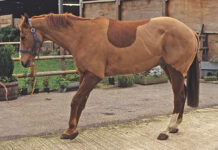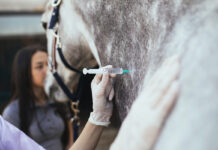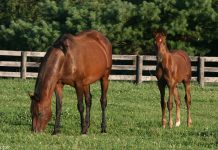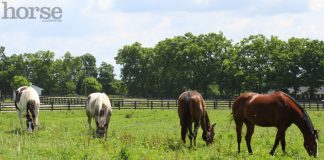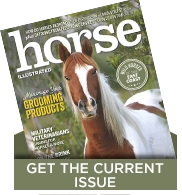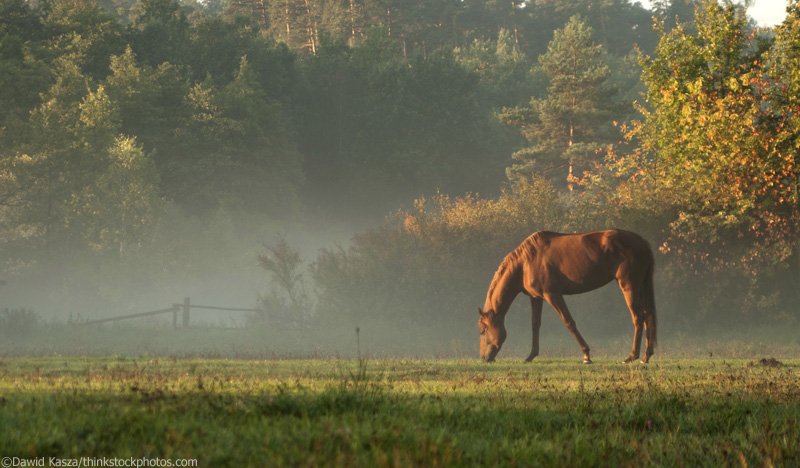
Metabolic Changes
Many older horses are affected by Cushing’s disease, which is caused by an overactive part of the pituitary gland – the correct name to this disease is pituitary pars intermedia dysfunction or PPID. One result of the pituitary dysfunction is that it alters the ability of the horse to regulate body temperature. In addition, a horse with PPID tends to grow a longer hair coat than normal, often with a shaggy appearance. Long hair insulates more than usual, making an affected horse more susceptible to overheating. This is especially true in more humid climates where evaporative cooling from sweat is a challenge for any age horse.
There are many ways to tackle this problem. First and foremost is to consult your veterinarian and arrange for an exam and appropriate laboratory work to achieve an accurate diagnosis. Then, the horse can be put onto medication (pergolide) to control a variety of metabolic changes associated with Cushing’s disease. The other thing you can do while waiting for the medication to work its magic to help the horse shed out is to take out the body clippers and shave away the overgrowth of hair. This simple act gives your horse much improved comfort in hot weather. For the aged horse that is still being ridden, removal of the hair makes it possible for him to sweat effectively to remove body heat. On particularly hot days, you’ll also want to soak him down to help him cool. In humid climates, it is usually safe to soak the whole body but in arid climates, it is best to only soak from the withers forward to avoid sudden chilling of the large hind end muscles.
Weight control is paramount for any horse and particularly for seniors. Excess fat provides an insulating layer that makes it difficult for a horse to dissipate body heat in hot climates. Body condition is managed by attention to a proper diet and also with exercise. To monitor body condition, you want to be able to just barely feel the last two ribs as you run your hand across your horse’s thorax. You shouldn’t see any sign of a cresty neck or fat pads along the shoulders or rump.
The older horse with metabolic issues is also particularly affected by excess sugars in pasture grass, making him more at risk of developing laminitis. Grazing time, if any, should be discussed with your veterinarian based on your horse’s individual needs and metabolic condition. Not all horses are able to be turned out on pasture due to previous laminitis or insulin resistance concerns, so check with your vet before giving him access to green grass.
A grazing muzzle is an effective tool that allows a horse to be turned out when possible but constrains how much pasturage he can graze in a given period of time. Most horses adapt just fine to wearing a grazing muzzle; through the small hole in the bottom, they are able to obtain some green grass without overindulging. Turnout to move around is important to any horse’s health and particularly to an older horse that may have some arthritic issues.
Pesty Pests
Insects are particularly annoying to all horses but older horses seem to have less resilience in dealing with them. The effort to stamp the legs, twitch the skin, move around to more agreeable areas of the paddock or pasture to avoid the bugs – these actions take energy and some older horses aren’t as motivated to resist the insects.
You can help your senior horse by cloaking him in a protective fly sheet and fly and ear mask. In some cases, netted leggings are also a benefit. Some fly masks are constructed in such a way that they can be worn while the horse is ridden. The use of insect sprays and roll on applicators is useful to protect the horse when the fly sheet is off and he is under saddle. In cases where a horse is particularly annoyed by the plague of insects, it helps to put him in a stall with a fan blowing toward him. The current of air from the fan adversely affects the insects’ ability to fly in that area and keeps them away. And, the fan provides a bit of cooling air for your horse.
The Big Picture
With diligent care and attention to the little details, you can provide your senior horse with a more comfortable summer experience. It is always smart to have your vet involved in the decision-making choices of how to feed and house your senior horse. Addressing health care concerns early on goes a long way towards keeping your senior horse feeling well into his golden years.
Liked this article? Here’s more on hot weather and senior health.
Riding off into the Sunset Years
Add Years to Your Senior’s Life
10 Tips to Stay Safe with Your Horse in Hot Weather
NANCY S. LOVING, DVM, is a performance horse veterinarian based in Boulder, Colo., and is the author of All Horse Systems Go.

